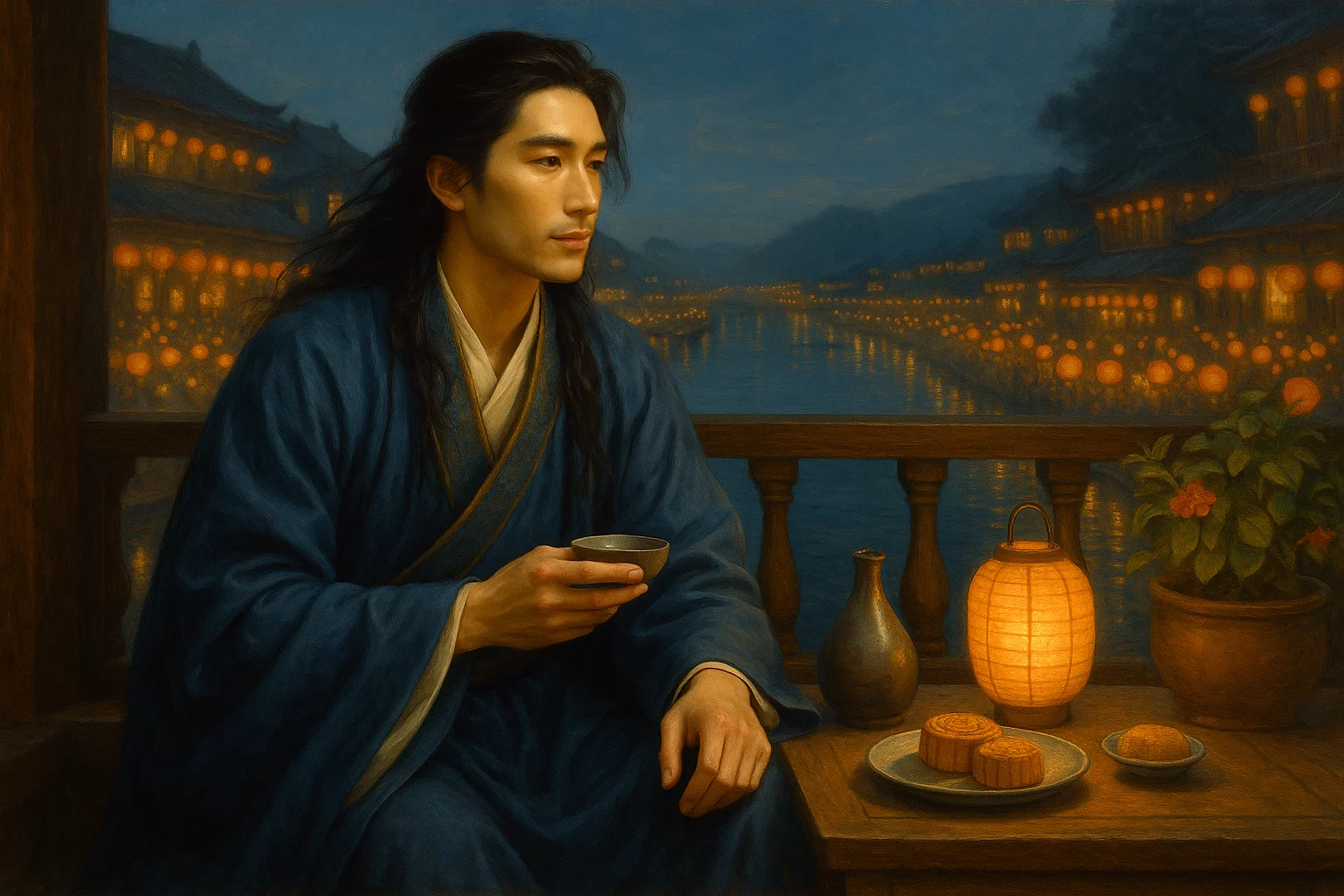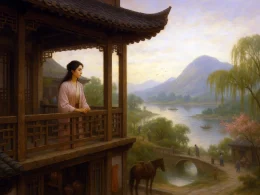Fish-scale tides slap willow piers,
Storm-doves haul rain downriver's gears.
Spring's cipher cracks earth's eastern code.
I pulverize tea to abort half-dreams,
Swallows solder mud-straw seams.
Sun's cursor resets on floral node.
Original Poem
「浣溪沙 · 水涨鱼天拍柳桥」
水涨鱼天拍柳桥。云鸠拖雨过江皋。
一番春信入东郊。闲碾凤团消短梦,静看燕子垒新巢。
周邦彦
又移日影上花梢。
Interpretation
This quintessential spring lyric by Zhou Bangyan was likely composed during his residence in Jiangnan or a period of unofficial retirement. Set in the heart of spring, the poem finds the poet immersed in garden landscapes, ostensibly delighting in nature's beauty while subtly conveying an ineffable melancholy about time's passage. Eschewing grand narratives or intense emotions, Zhou instead focuses on delicate observations—swelling waters, awakening tea, returning swallows, shifting sunlight—that collectively reveal profound meditations on life's emptiness and inner loss. Characterized by elegant restraint and refined introspection, this work exemplifies Zhou's "pure and dignified" style while showcasing his mastery in crafting poetic atmospheres.
First Stanza: "水涨鱼天拍柳桥。云鸠拖雨过江皋。一番春信入东郊。"
Shuǐ zhǎng yú tiān pāi liǔ qiáo. Yún jiū tuō yǔ guò jiāng gāo. Yī fān chūn xìn rù dōng jiāo.
Swollen waters merge with sky, lapping willow bridges;
rain-dragging cloud doves cross river meadows.
Spring's missive penetrates eastern suburbs.
The opening stanza paints spring's arrival through aquatic metamorphosis. "Swollen waters merge with sky" (水涨鱼天) creates a liquid horizon where fish seem to swim through heavens—an ethereal metaphor for spring's clarity. The "cloud doves" (云鸠), dark rain-bearing clouds resembling mourning doves, trail precipitation across landscapes, embodying spring's dynamic transitions. The closing line anthropomorphizes spring as a courier delivering its "missive" (春信) to the eastern wilds, suggesting nature's messages are legible to the attentive observer.
Second Stanza: "闲碾凤团消短梦,静看燕子垒新巢。又移日影上花梢。"
Xián niǎn fèng tuán xiāo duǎn mèng, jìng kàn yànzi lěi xīn cháo. Yòu yí rì yǐng shàng huā shāo.
Leisurely grinding Phoenix Cake tea to dispel brief dreams;
silently watching swallows mortar new nests.
Again sunlight climbs to blossom tips.
The second stanza shifts to domestic stillness. The ceremonial "grinding Phoenix Cake tea" (碾凤团)—referencing a prized Song dynasty tea compressed with phoenix designs—becomes a meditative act to dissolve ephemeral dreams. The contrast between the poet's stillness and swallows' construction work (燕子垒新巢) highlights human passivity against nature's industry. The final line's "again" (又) marks solar movement with quiet urgency, measuring imperceptible time through floral shadows.
Holistic Appreciation
Zhou constructs a diptych of outdoor vitality and indoor contemplation. The first stanza's expansive waterscapes and meteorological activity contrast with the second's confined tea ritual and architectural observation. This spatial tension mirrors the poem's central paradox: spring's explosive rebirth accentuating human detachment.
The poet's genius lies in making mundane phenomena—cloud movements, tea preparation, nesting birds—carry metaphysical weight. Water's swelling, tea's awakening, swallows' building, and sunlight's climbing become correlatives for consciousness itself—the mind's ebb and flow between engagement and withdrawal. Zhou's restrained diction ("leisurely," "silently," "again") barely conceals an existential undercurrent: that spring's exuberance highlights human temporality.
Artistic Merits
- Hydraulic imagery
The "swollen waters" (水涨) symbolize both seasonal change and emotional saturation, their sky-merging quality reflecting meditation's boundlessness. - Ornithological metaphor
"Cloud doves" (云鸠) and swallows (燕子) form avian bookends—one bringing rain, the other building homes—encapsulating nature's cyclical labor. - Temporal markers
The tea's "brief dreams" (短梦) and sunlight's incremental movement (日影上花梢) measure time through ephemeral phenomena rather than clocks. - Sensory restraint
Zhou avoids overt sensory language, allowing actions (grinding, watching) and natural events (rain, nesting) to imply emotional states.
Insights
This poem reveals how Zhou transforms seasonal observation into existential algebra. Each natural event becomes a variable in an equation calculating human presence against time's passage. The "swollen waters" measure spring's intensity, the "brief dreams" human transience, and the climbing sunlight life's irreversible trajectory.
For modern readers, Zhou's poem models ecological mindfulness—the practice of reading environment as spiritual text. His "cloud doves" and nest-building swallows teach that nature's ordinary processes (precipitation, reproduction) are extraordinary when observed with poetic attention. The work ultimately suggests that meaning resides not in dramatic events but in daily phenomena—a teacup's steam, a bird's labor, a shadow's creep—if we cultivate Zhou's quality of patient, penetrating gaze.
About the Poet

Zhou Bangyan (周邦彦 1056 - 1121), a native of Qiantang (modern Hangzhou, Zhejiang), was the culminating master of the wanyue (graceful and restrained) ci poetry of the Northern Song Dynasty. A virtuoso in musical temperament, his ci are renowned for their opulent refinement and technical perfection. He created dozens of new melodic patterns (cipai) and adhered to strict tonal rules, earning him the title "Crown of Ci Poets." His influence extended to Southern Song masters like Jiang Kui and Wu Wenying, establishing him as the founding patriarch of the Rhymed Ci School.












